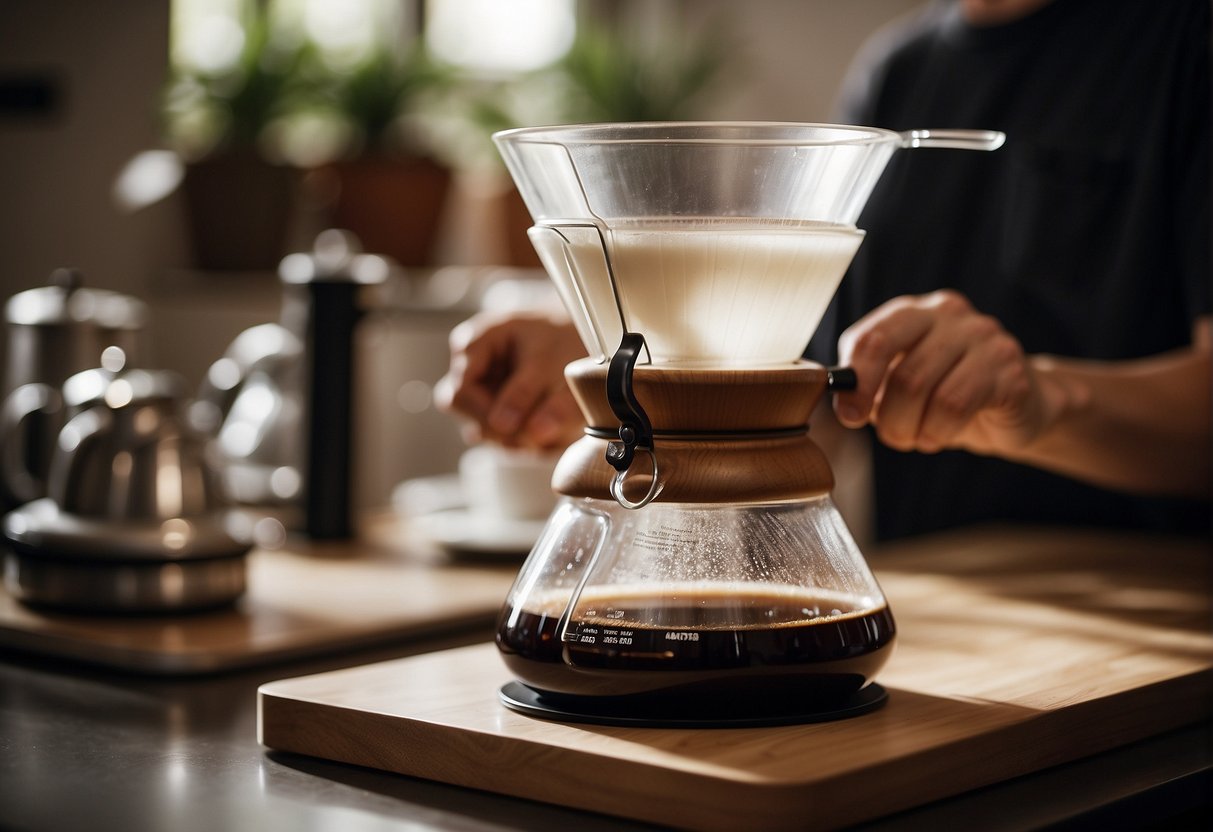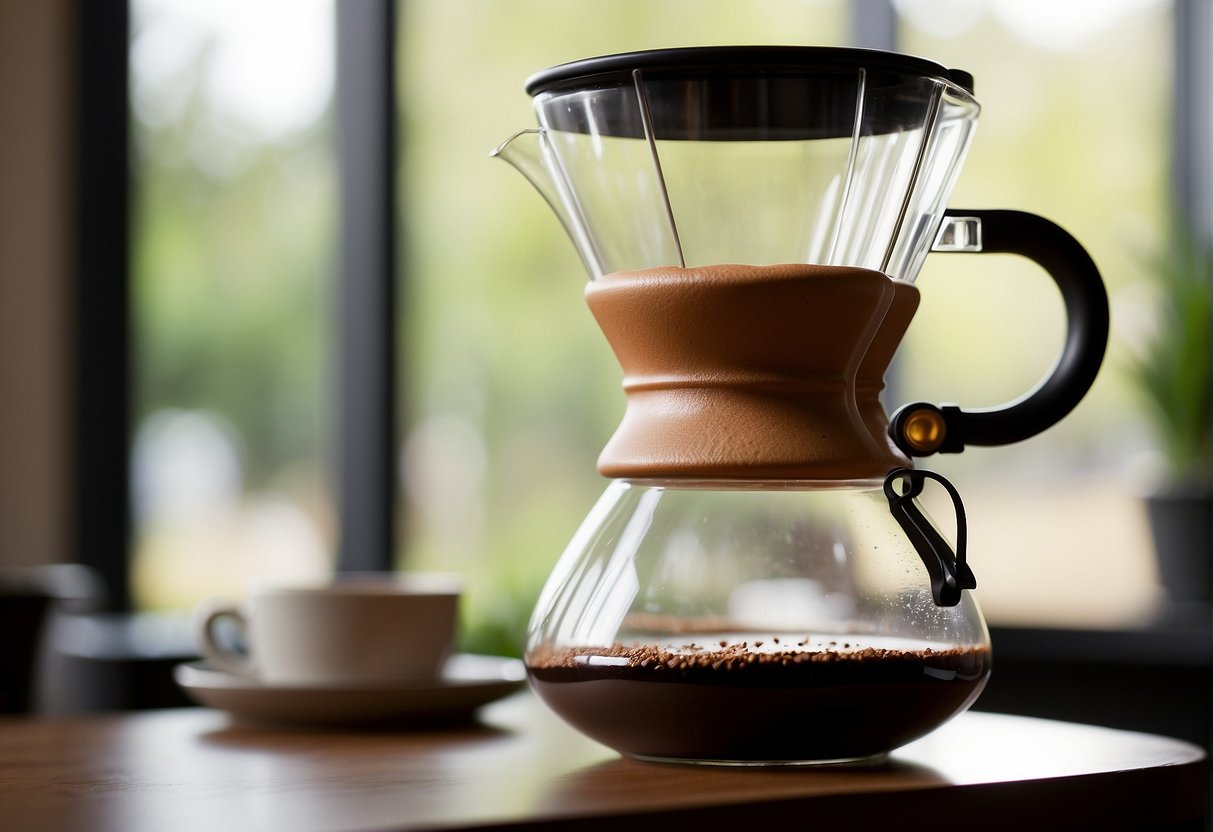Choosing the right coffee filter is a pivotal step in the brewing process, impacting both the flavor and the body of the final cup. The Chemex, renowned for its elegant design and smooth coffee, typically requires its own specific brand of filters to achieve that clean taste it’s
Understanding Chemex and Melitta Filters
https://www.youtube.com/watch?v=cAicYBJhbdQ&embed=true
Choosing the right coffee filter is crucial for achieving the desired quality and flavor in coffee brewing. This section examines the compatibility between Chemex and Melitta filters, as well as the differences between paper and metal options, underscoring the importance of filter selection for optimal results.
Compatibility and Differences
Chemex filters are specifically designed for use with Chemex coffee makers. They are cone-shaped and significantly thicker than standard paper filters. This design not only affects the brewing time but also plays a key role in the removal of oils and sediments, resulting in a cleaner cup of coffee. On the other hand, Melitta filters are traditionally designed with a flat bottom and fluted sides, which can be a mismatch for the Chemex brewer, leading to potential issues with fit and filtration. The unique shape of Chemex filters allows them to control the flow rate during brewing, which is a pivotal aspect of their functionality.
Paper Filters Vs. Metal Filters
When exploring Chemex accessories, enthusiasts often debate between the use of paper filters and metal filters. While metal filters are reusable and offer an eco-friendly alternative, they usually produce a different flavor profile, allowing more oils and fines into the brew compared to paper filters. The selection between paper and metal filters comes down to personal preference for taste, with paper filters typically resulting in a lighter, cleaner taste, whereas metal filters can produce a fuller-bodied coffee.
Importance of Filter Selection
Filter selection profoundly influences the brewing process and, consequently, the quality of the cup. The Chemex’s proprietary filters are designed to ensure a precise extraction by controlling the flow rate, which impacts the final taste. Using a Melitta filter in a Chemex can affect this balance due to the differences in paper thickness and filter shape. It is also possible to use a reusable filter, such as cloth or metal, which can modify the flavor by allowing more oils to pass through. It is critical for users to consider the unique properties of each filter type to produce their desired coffee profile.
Optimizing the Brewing Process

To achieve the perfect cup using a Chemex with Melitta filters, precise control over grind size, filter preparation, and the brewing parameters is essential. This section breaks down these critical factors.
Grind Size and Texture
Coarse grind: A coarse grind texture aids in a smooth and even extraction when using Melitta filters in a Chemex, preventing unwanted bitterness.
Medium-coarse grind: This grind is often ideal, balancing extraction rate and flavor. They can use a regular coffee grinder to achieve this consistency, ensuring the water filters through at an appropriate rate, and extracting the right amount of flavor.
Folding Techniques for Filters
-
Standard fold: The Melitta filter may be adapted by folding the crimped edge in a manner that creates a cone shape similar to Chemex filters, which helps the filter fit properly.
-
Alternative methods: Some users might customize their fold, creating a triple-layered side opposite the spout, as this guide suggests, to mimic the thickness of authentic Chemex filters and provide stability during pouring.
Brewing Time and Temperature
-
Temperature: The optimal water temperature for brewing is between 195°F and 205°F, crucial in extracting the full range of flavors without scalding the coffee.
-
Pour-over technique: They must pour water in a slow and steady spiral, starting from the center, moving outward, and back to the center. Control from the spout is key for even saturation.
-
Brewing time: For a Melitta filter in a Chemex, a total brew time of around 3.5 to 4.5 minutes is generally recommended. A longer time might over-extract, while a shorter one risks under-extraction, leading to an imbalanced cup.
Taste and Aroma Considerations

Selecting the appropriate filter is crucial as it directly impacts the taste and aroma of the brewed coffee. Melitta filters, when used in a Chemex, can influence the coffee’s flavor and mouthfeel due to their unique properties.
Filter Properties and Coffee Flavor
Melitta filters are typically thinner than the filters designed specifically for Chemex. The thinner material can lead to a faster water flow, which affects the extraction process. A proper extraction is key to a richer flavor, as it ensures that the right amount of oils and flavors are captured from the coffee grounds. Thinner filters may not remove as many oils and could result in a coffee that has a less complex flavor profile.
Issues with Paper Taste and Sediment
One issue that might arise from using Melitta filters in a Chemex is the introduction of a papery taste to the brew. The lighter weight paper can potentially allow this undesired flavor into the coffee. Additionally, because these filters may not fit perfectly in the Chemex, they can sometimes cause an uneven extraction. This not only affects the taste but could also allow more sediment into the cup, leading to a bitter aftertaste. The proper fit of the filter in the brewing apparatus is therefore essential to minimize the risk of sediment and ensure the coffee has a cleaner, more refined taste.
Alternative Brewing Methods
When exploring various brewing methods for coffee, enthusiasts often look for alternatives to disposable filters. Reusable options and comparisons to other brewing techniques can reveal differences in flavor, strength, and overall coffee experience.
Exploring Reusable and Cloth Filters
Reusable metal filters and cloth filters offer sustainable alternatives to traditional paper filters. They allow for a richer extraction as the oils and finer coffee grounds that contribute to flavor are not filtered out. Reusable metal filters, which can be used with a Chemex, produce a cup with more body and strength. Cloth filters, on the other hand, provide a unique balance; they allow some oils to pass through but offer a cleaner cup than metal filters, retaining more subtleties in flavor compared to the robustness of metal-filtered coffee.
French Press and Espresso Comparisons
The French press and espresso are distinct from the pour-over method, each with its own merits. A French press extracts coffee by steeping grounds in boiling water, creating a strong and full-bodied brew with a distinct texture and taste. Espresso, on the other hand, is made under high pressure, delivering a concentrated shot with bold flavor and a creamy mouthfeel. Both methods differ significantly from Chemex’s cleaner and more nuanced cup. When comparing to a Chemex using a Melitta filter, these methods yield a heavier and more robust profile, while the pour-over preserves the intricate flavors and offers a lighter body.
Maintaining and Caring for Your Equipment
Maintaining your coffee brewing equipment is essential for consistently high-quality coffee. Proper cleaning, storage, and handling of your carafe and filter paper can make a significant difference in the lifespan of your tools and the taste of your coffee.
Cleaning and Storage
Carafe: The all-glass construction of the Chemex carafe demands gentle handling. It should be washed with warm, soapy water after each use, using a soft sponge to avoid scratching. It is essential to thoroughly rinse the carafe to prevent soap residue that could affect the taste of the coffee.
Filter Paper: Always remove the used Melitta filter paper immediately after brewing. Rinse the filter holder with hot water and let it dry thoroughly before storing. Store the additional filters in a cool, dry place away from any strong odors that could influence the flavor of your coffee.
Addressing Wear and Filter Shortages
Carafe: Inspect the carafe regularly for any chips or cracks, as its breakable nature requires careful use. Replace immediately if damaged to avoid safety hazards.
Filter Shortage: In times of filter shortage, one can adapt a Melitta filter by folding it into a cone shape to fit the Chemex. Keep in mind that this might alter the taste and efficiency of the brew. Ensure your grinder is set for a coarser grind to counter potential differences in extraction time when using an alternative filter paper.
